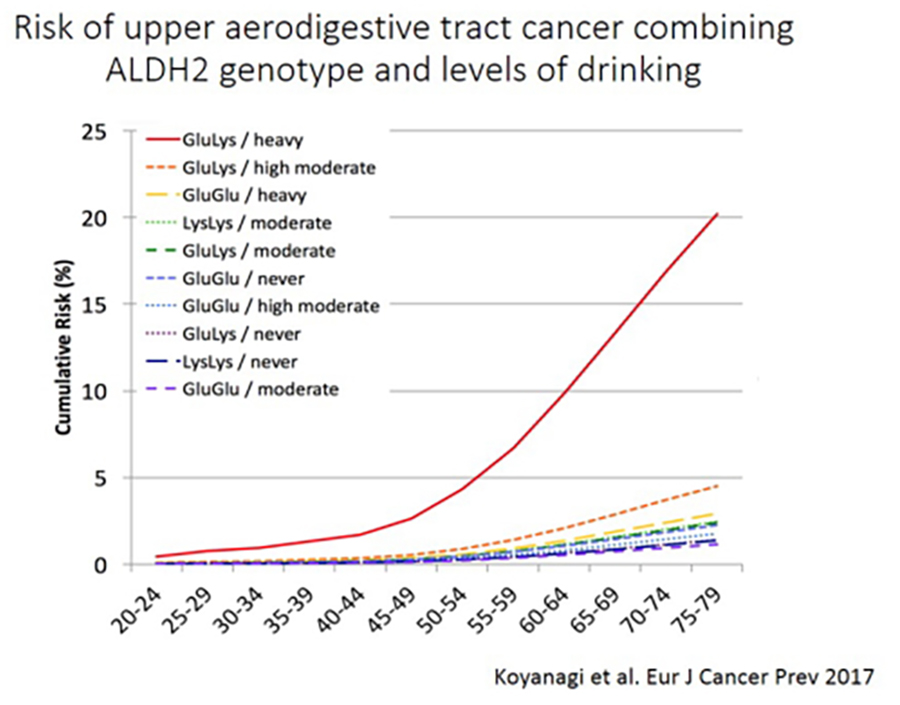Division of Cancer Epidemiology and Prevention
Introduction
We are conducting epidemiological studies on cancer at the Division of Molecular and Clinical Epidemiology and Division of Epidemiology and Prevention, ACCRI. In our group, research interests range from conventional environmental risk factors to genetic risk factors and their applications in cancer prevention. We are one of the leading groups studying cancer epidemiology in Japan.
Research topics
We have been conducting a hospital-based epidemiological study known as HERPACC (Hospital-based Epidemiologic Research Program at Aichi Cancer Center) since 1988. In this study, we collected environmental information and blood samples to identify risk/protective factors for cancer. This study provided a basis for a subsequent research project, and we are attempting to extend our work to both prevention and treatment of cancer.
Evaluation of risk/protective factors for cancer
We are evaluating the risk/protective factors for cancer among environmental and genetic factors and their combinations. Our studies address the following:
- Environmental factors including diet
- Genetic factors
- Interaction between environmental and genetic factors
- Risk prediction of cancer based on environmental and genetic factors
- Heterogeneous impact of risk factors based on molecular differences in cancer
One of the representative studies that was published can be accessed at the link below the below:
Development of a prediction model and estimation of cumulative risk for upper aerodigestive tract cancer on the basis of the aldehyde dehydrogenase 2 genotype and alcohol consumption in a Japanese population
In this study, we developed a risk prediction model using age, sex, smoking, drinking, and the ALDH2 genotype. We then confirmed the validity of the developed model. To further extend this risk prediction method for actual prevention, we estimated the cumulative risk of upper aerodigestive tract cancer according to a combination of drinking and the ALDH2 genotype.

Cancer survivorship study
The most significant factor in cancer prognosis is treatment; however, little is known about the potential prognostic impact of non-treatment factors including the environment and genetics. Using data from the HERPACC, we are attempting to develop an evidence-based approach for improving the lifestyle of patients with cancer.
Our example study can be accessed at the link below. This study revealed the significant impact of folate consumption and genetic polymorphisms on folate-metabolizing enzymes.
International collaborative studies
- International Head and Neck Cancer Epidemiology Consortium (INHANCE)
- International Lung Cancer Consortium (ILCCO)
- Breast Cancer Association Consortium (BCAC)
- Ovarian Cancer Association Consortium (OCAC)
- Collaborative Oncological Gene-environment Study (COGS)
(BCAC/OCAC/COGS Centre for Cancer Genetic Epidemiology) - International Lymphoma Epidemiology Consortium
(InterLymph International Lymphoma Epidemiology Consortium) - Asia Cohort Consortium
Breast cancer prevention study using risk prediction model
The incidence of breast cancer is increasing in Japan. This study project aims to develop a risk prediction model and evaluate its application in cancer prevention. The project is supported by AMED, a funding agency in Japan. We are collaborating with the National Cancer Center, Kagoshima University, National Institute of Public Health, Tokushima University, and Kagoshima University.
Development of cancer prevention guidelines for Japanese
We are summarizing existing epidemiological evidences in Japan to come up with cancer prevention guidelines for Japanese individuals.
Japan Muliti-Institutional Collaborative Cohort (J-MICC) study
J-MICC is the first and largest molecular epidemiological cohort study in Japan. We are one of the research groups participating in the J-MICC.
Three Prefecture Cohort Aichi Study
Three Prefecture Cohort Aichi Study is a population-based cohort study developed in 1985 at the Chikusa-ward in Nagoya city and Asuke town in Toyota City. In collaboration with two other research groups (Miyagi and Osaka), we have reported many important results.
Clinical epidemiological studies
We are engaged in various clinical epidemiological studies. We provide statistical and epidemiological support in collaboration with our clinical counterparts.
Members
1996-1998 Resident, Kameda General Hospital
1998-1999 Resident, Okayama University Hospital
1999-2001 PhD Candidate, Nagoya University Graduate School of Medicine (2001 PhD)
1999-2001 Trainee, Aichi Cancer Center Research Institute
2001-2002 MSc Candidate, Department of Epidemiology, Harvard School of Public Health (2002 MSc)
2002-2005 Junior Researcher, Division of Epidemiology and Prevention, Aichi Cancer Center Research Institute
2006-2008 Senior Researcher, Division of Epidemiology and Prevention, Aichi Cancer Center Research Institute
2008-2013 Section Head, Division of Epidemiology and Prevention, Aichi Cancer Center Research Institute
2013-2015 Professor, Department of Preventive Medicine, Kyushu University Faculty of Medical Sciences
2015-2018 Division Chief, Division of Molecular and Clinical Epidemiology, Aichi Cancer Center Research Institute
2015-2018 Visiting Professor of Epidemiology, Nagoya University Graduate School of Medicine, Nagoya, Japan
2018-Present Division Chief, Division of Cancer Epidemiology and Prevention, Aichi Cancer Center Research Institute
2018-Present Adjunct Professor, Department of Cancer Epidemiology, Nagoya University Graduate School of Medicine
2011-2015 Resident physician
2015-2016 Kyushu University Graduate School of Medical Sciences
2016-2018 Nagoya University Graduate School of Medicine (Ph.D.)
2018- Present Division of Cancer Epidemiology and Prevention, Aichi Cancer Center Research Institute, Senior Researcher.
2004 Kyushu University Graduate School of System Life Sciences (Master of System Life Science)
2012 Kyushu University Graduate School of System Life Sciences (Ph.D.)
2014-2017 National Cancer for Geriatrics and Gerontology
2018-2023 Hamamatsu University School of Medicine
2023-Present Aichi Cancer Center Research Institute, Researcher
Overview of research conducted to date: https://researchmap.jp/LifeSciences
2012-2022 After Resident physician, Nagoya City University Hospital , Staff
2022-Nagoya City University Graduate School of Medical Sciences
2023-Present Aichi Cancer Center Research Institute, Research Resident
Publications
Education & Training
Our laboratory is a part of the Nagoya University Graduate School of Medicine. Foreign graduate students are welcome to study in our programs, including those who are supported by the Japanese Government Monbusho (MEXT) scholarship. For details regarding entrance examinations and scholarships, please follow this link NAGOYA UNIVERSITY GLOBAL 30 INTERNATIONAL PROGRAMS.

